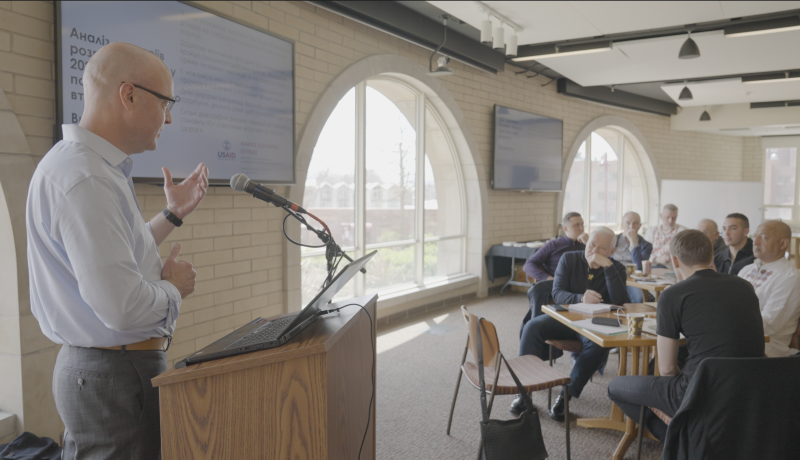Ukrainian Mayoral Delegation Visits Denver, Korbel School

Korbel School Professor Keith Gehring speaks to a group of Ukrainian mayors.
The group of Ukrainian mayors who visited the University of Denver last week may not have been a typical delegation to the annual Cities Summit of the Americas, but their presence on DU’s campus was impactful, nonetheless.
The five mayors spoke with Korbel School of International Studies professors Rachel Epstein, Martin Rhoades and Lapo Salucci about their experiences leading their citizens through Russia’s invasion of Ukraine, a war which has displaced more than 14 million people. The roundtable included mayors Vitaliy Klychko of Kyiv, Ihor Terekhov of Kharkiv, Ivan Federov of Melitopol, Yuriy Bova of Trostyanets and Oleksandr Kodola of Nizhyn.
Despite the heavy human and infrastructural toll the war has taken on their cities, the mayors centered much of the discussion on the regrowth that has been achieved in the past few months.
Mayor Kodola of Nizhyn, a northern city in Ukraine’s Chernihiv region, spoke through a translator. He said the fighting in Nizhyn lasted a month and a half, resulting in many casualties and much destruction.
But he said he was proud of how the city has rebuilt following the conflict.
“For more than one year, we’ve given life back to our city and restored [it] to full capacity,” he said. “My task as the mayor is to restore life in the city.”
Bova is mayor of Trostyanets, which was occupied by Russia on Feb. 24, 2022, and liberated just over a month later.
He said that Russians tortured and robbed Trostyanets’ citizens, stealing all of the city’s computers.
“But almost 99% of people have returned to the city,” Bova said.
He thanked the U.S. for its role in supporting Ukraine through the war, saying, “[A] huge part of restoration of the city is due to international connections.”
Following the mayors’ conversation with professors Epstein, Rhoades and Salucci, the group attended a presentation by Korbel professor Keith Gehring that detailed several possible scenarios for Ukraine’s recovery, as determined by the Frederick S. Pardee Center for International Futures.
Gehring shared that the Pardee Center had developed four scenarios for Ukraine’s future pre-invasion by Russia—and said that the applicability of those predictions is limited but shouldn’t be entirely discounted.
Gehring then outlined four post-invasion scenarios: No war, war, success and misfortune.
The first scenario, “no war,” is counter factual, Gehring said.
“We do this so that we can baseline existing dynamics in the model and compare that with the alternative scenarios that are closer to our reality,” he said.
The other three scenarios are a closer representation of what is currently happening in Ukraine.
“We have to make bold assumptions, so the effects of war are resident in all three scenarios, but they also assume a stagnation or cessation in conflict by 2033,” Gehring said.
The “war” scenario includes approximated shocks to economic growth, trade, agriculture and the energy system and other potential shifts caused by Russia’s invasion.
The “success” scenario involves meeting top governmental targets for recovery in multiple categories, while the “misfortune” scenario sees recovery efforts fail to meet not only Ukrainian governmental goals, but also World Bank and European Commission targets.
Among Gehring’s key takeaways was a warning about Ukraine’s potential reliance on foreign aid—a factor that all the mayors expressed gratitude for during the roundtable discussion.
“In the near term, of course, aid will be essential. But that, too, is problematic,” he said. “[That] dependency [could] limit long-term growth as well the interests of the international community, which waxes and wanes.”